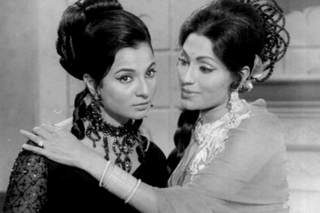
Woe Is Me! “Am I Too Judgmental Of My Friends?”
A series in which The Swaddle team indulges your pity party with advice you’ll probably ignore.

Woe Is Me! is a series in which The Swaddle team indulges your pity party with advice you’ll probably ignore.
Recently, I’ve had a tiff with a friend on the morality of some of her decisions. I withdrew because the behavior made me question and evaluate the place they hold in my life. I feel super judgemental now. I mean, yes the whole process of being assertive and evaluating are nicer terms for judging my friends, aren’t they? I usually play nice but now that I’m being called out for being judgemental, I wonder if this is me being unnecessarily super judgey or just taking care of myself. I’m beginning to feel like I may become friendless. Or maybe I’ll end up with a few people with stronger bonds? Where is this leading me?
— Judgy Judgerson
AS: Oof this is a tricky one. First, stating the obvious — judging your friends, which you seem to realize you’re doing, is not okay. You don’t have the moral high ground to decide whether your friend’s decision was right or wrong. And even if it was wrong in your books, they need not feel the same way, and that’s okay. You say ‘being assertive’ or ‘taking care of myself’ — but from how you’ve stated this, your friend didn’t hurt you, or do anything that impacts you. So what are you protecting yourself from? Moral degradation? I don’t get it. However, having said that — I understand how sometimes we can’t help but judge, and doing that doesn’t make us a bad person. In a way, being aware of this tendency to judge is a good thing, so we can work on it. Since this is your friend, you have the opportunity to have an open conversation, understand their point of view. Who knows — maybe they need your support and understanding now more than ever? Since I don’t know much about this, I can’t say where this is leading you. But think about it: how would you make stronger bonds anyway, if you aren’t open-minded towards how your friends think?
DR: Did your friend commit a murder? Have they been accused of bullying or abusing someone? Are they cheating on their partner(s)? Did they steal your candy? Do they prefer to brush their teeth after their first cup of tea/coffee for the day? I’m sure you’re aware that morality is very, very diverse and subjective, right? Not only is there no one-size-fits-all when it comes to morality, but it can also lead us to have a very black-and-white view of a rather grey world that we live in. And imposing our ideas of morality on even our close friends and family can be extremely unfair to them because while it may seem like we know their lives inside out, we haven’t really lived their lives, and don’t really have a right to comment on the morality of their actions and commissions. Sure, if you don’t agree with the morality of their actions, you can express your concerns, and if they’re open to it, even indulge in a debate or discussion. But beyond that, I don’t think there’s anything you can (or, perhaps, even should) do to make them conform to your moral values.
Having said all of that, I was about to praise your ability to introspect and ask these questions of yourself. But then I began wondering whether it’s simply the fear of “becoming friendless” that has inspired this introspection. No matter what the inspiration may be, it’s never too late to start being self-aware. If you have been accused of being judgmental multiple times in the past, perhaps, it’s not too bad an idea to ask yourself if there may genuinely be any truth to that.
At the same time, given that I don’t know what it is that you judged your friend for, I don’t want to be too harsh on you. If you think your decision to cut off ties with them is justified, and you’re happier for it, then so be it. I mean, it’s not difficult to imagine a situation where one cuts off a toxic friend from their lives, only to be called “judgmental” for it by the estranged friend and their buddies. I trust that you’d be able to judge (no pun intended) what you’re going through the best — and if you can’t, you can always see a therapist. But, no matter what, don’t forget to introspect. Good luck!
LG: Dear Mid-Friend Crisis, look, we all have values and make judgments, even about those closest to us. So don’t be too hard on yourself. Self-righteousness is probably the only thing all of humanity has in common. That said, while it’s common, it’s not necessarily a good look for leaving the house if you know what I mean.
Friendships are often based on shared values, so it can feel like a betrayal when a friend doesn’t live up to your expectations. I get that. But your expectations are just that — yours. I wonder if your friend shares them, even if they share your values; after all, it’s possible to live up to values in many different ways. In fact, that’s the world’s problem: too many people think they have THE ONLY, THE RIGHT WAY of living up to values that most of us share. Lots of people value loyalty — one person might fulfill that by being physically monogamous, while another fulfills that by defending their friends no matter what. (And of course many others in many other ways.) The former might judge the latter for not considering the context of their friend’s behavior. (What if the friend murdered someone?) The latter might see physical monogamy as silly, placing more importance on emotional monogamy.
You’re unlikely to convince any friend that yours is THE ONLY, THE RIGHT WAY and their decisions are wrong. What you can do is talk to them about how their actions make you feel. If they seem not to care, or ‘care’ but continue to act in a way that hurts you, maybe that’s the answer as to whether they should be your friend. If they care, but still hold conviction in their actions, you can either seek to understand them more and maybe end up respecting and valuing them more for their different perspective — or you can cut them out of your life. I think you know which is judge-y and which isn’t, which will see you keeping friends, even if the friendship changes, and which won’t. Tl/dr: Morality doesn’t exist, and yes, you’re judgmental. But so are we all, Your Honor. So are we all.
KB: Without a little more information on what the tiff was about, it’s hard to weigh in. But I will say this: in almost every instance, it pays to be kind and open-minded and non-judgmental. (The exceptions are if someone said things horrifically bigoted and totally out of line with values you hold deeply important and morally incontrovertible). But listen, we are all on a perpetual journey of learning and evolving, and it’s not your role as a friend to call people out every time they stumble along this journey. One of the wonderful things about true friendship is acceptance and unconditional love, so try to channel those vibes in your interactions with your friends. Think of it this way: in five years, will you remember the thing you disagreed about, and more importantly… will it matter to you? If the answer is no, then these are not things worth pushing your friends away over. You are entitled to your (strong) opinions, but there is nothing to be lost by treating your friends with grace even when they disagree with you. Patience and kindness usually get you to the right place in the end.
RD: Hello, since you’ve been advised to temper your judgments enough, I’d say it’s perfectly okay to judge your friends. Judge them, let them know, question them, fight with them — if you come out of it intact, great. If you don’t, oh well. Yes of course you should question whether your judgment is valid, but also focus on the part that you are in fact judging them — for whatever it may be, there is definitely some underlying reason you don’t approve of whatever you don’t approve. Pay attention to it, speak up, and see what your friends say. In friendship, you’re not required to be perfect, and neither are they. Do with this what you will.
Related


The Buzz Cut: After #FreeBritney, Can the Media Learn to Treat Female Stars With Dignity?
